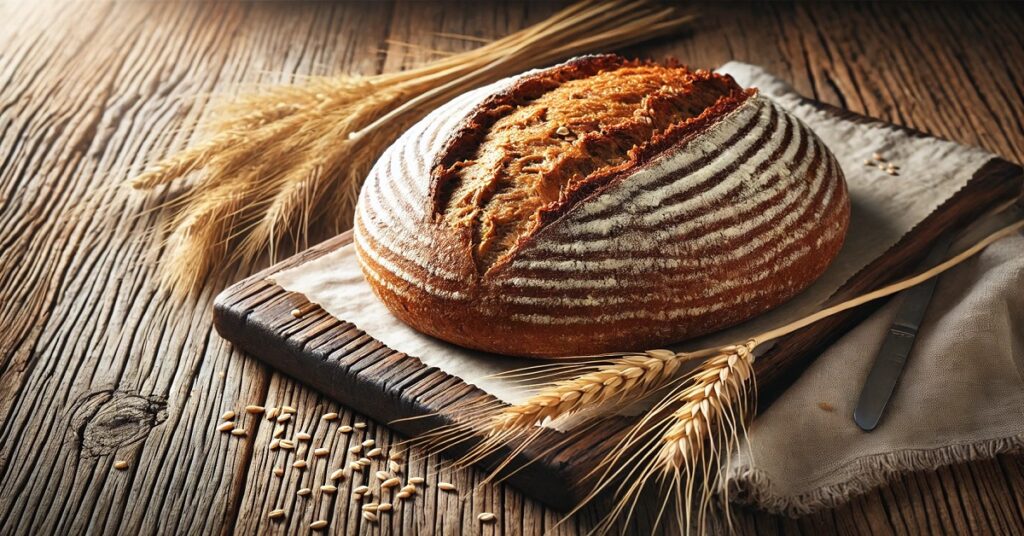What is Wheat Bread?

Wheat bread is an ordinary loaf typically made from whole wheat flour, water, yeast, and salt with some added ingredients to make it dense or for flavor. Unlike white bread flour, the one used contains some bran and germs, a great source of fiber, vitamins, and minerals.
This whole-grain characteristic makes wheat bread healthier than refined white bread. Owing to its whole-grain composition, it has a unique, robust flavor and a heavier body. Wheat bread is part of the diet in many cultures, from breakfast to a meal companion.
Table of Contents for Wheat Bread Article:
- What is Wheat Bread?
- Is Wheat Bread Safe for All Ages?
- A Brief Personal Experience with Wheat Bread
- Is Wheat Bread Good for All Age Groups?
- Benefits of Wheat Bread for Health
- Wheat Bread Benefits for Skin and Hair
- Ways to Incorporate Whole Wheat Bread into Your Diet
- Good Facets of Wheat Bread
- Advice to the Reader
- Frequently Asked Questions About Wheat Bread:
- Quick Summary
- This structure provides a comprehensive and reader-friendly guide for an article about wheat bread.
Is Wheat Bread Safe for All Ages?
The high nutrient profile of wheat bread makes it suitable for almost anyone, from toddlers to elderly adults. It is a good source of dietary fiber for digestive health and sustains energy via complex carbohydrates.
But those who are gluten intolerant, allergic to wheat, or have celiac disease need to skip it or use gluten-free bread. Wheat bread is a good source of complex carbs for the whole family, and the B vitamins, iron, and magnesium it contains also help children grow healthy and meet their needs for metabolism and energy.
A Brief Personal Experience with Wheat Bread
For Paragraph 1: Wheat bread has always been my comfort food. It was a staple of the household from my first memories, used in school lunches to family dinners. When straight out of the oven, it gives off an earthy aroma that I have never stopped enjoying, as it brings me warmth and fullness.
Wheat bread is something I have always used for my meals as a health-oriented option since the beginning of my healthy living journey. A solid sandwich packed with veggies or a side for my soups never fails to hit the spot without weighing me down.
Paragraph 3: I learned that in many ways. I have also eaten it toasted or as a crouton, making finger foods from attractive creative spreads and toppings on the base. Each has added a bit of diversity to my meals and helped keep me on track with my nutrition goals.
Every once in a while, I try to bake my wheat bread, and one memory stays with me as the color of the sky during golden hour would. The experience, in turn, made me appreciate it more. Kneading the dough and waiting for it to rise led to a new appreciation and enjoyment of this food as I took my first bite into that warm, golden loaf.
Paragraph 5: Wheat bread has also been a social food for me. Sandwiches unite people, whether you make them for family picnics or send a friend slides of your sandwich creations; they are connective foods. Every piece becomes more than just food. It fits into moments together and memories.
I have also noticed that it has a beneficial effect on my health (paragraph 6). Consuming it has eased my digestion, increased my energy, and helped me stay fuller for longer, which is beneficial for weight management.
Is Wheat Bread Good for All Age Groups?
Wheat bread contains vitamins, minerals, and fiber essential for aging humans of any age, so it is nutritionally beneficial for all. For kids, it offers vitamins and minerals for development and energy to stay on the go.
Wheat fiber is helpful for the digestive system and the prevention of chronic diseases. It can provide easily digestible nutrition, promoting heart health and metabolic function for older adults. But for those who need to avoid wheat flour, such as anyone experiencing gluten intolerance, look elsewhere.
Benefits of Wheat Bread for Health
Wheat bread is good for health due to its high fiber content, vitamins, and minerals. For one, its fiber cleans the gastrointestinal tract twenty-four hours apart. Second, it has B vitamins, which are essential for energy metabolism.
Third, wheat bread contains iron, which is necessary for the blood. Wheat bread is also rich in magnesium and potassium, which help control blood pressure and minimize the chances of cardiovascular diseases.
Wheat Bread Benefits for Skin and Hair
Wheat bread contains B vitamins and antioxidants that help promote skin and hair health. B vitamins, on the other hand, maintain skin elasticity and encourage hair growth; antioxidants fight free radicals that can lead to aging. Daily intake of wheat bread can hydrate the skin inside and keep it glowing.
It also contains a small amount of zinc, which can help strengthen hair and prevent breakage. Wheat bread is not a beauty treatment but an overall health treatment. The intake of these breads conveys the nutrients needed for wheat to maintain this process, so as long as skin and hair will shine.
Ways to Incorporate Whole Wheat Bread into Your Diet
Wheat bread is straightforward to your diet. It can be the base of sandwiches, toasted with spreads, served as a breakfast item, or on the side with soups and salads. Whether you add honey and fruits for a pinch of sweetness or avocado and eggs for savory flavor, wheat bread goes well with each one of the combos. It is healthy for any meal, and you can add it to open-faced sandwiches with nutrient-dense toppings.
Good Facets of Wheat Bread
Rich in Dietary Fiber: Good for intestine health.
Nutritious: It is rich in B vitamins, iron, and other minerals.
Low cost: [These things are] found in almost every grocery store and are cheap.
Long-Lasting Shelf Life: This lasts for days if stored properly.
Studies on Wheat Bread Trusted Source (5 Paragraphs)
For instance, paragraph 1 indicates that many reports have observed the health-promoting impacts of 100% wheat bread, especially for cardiometabolic health. Studies have shown that individuals who consume whole grains have a lower risk of heart disease and better control over blood pressure.
The second paragraph: Studies examine how wheat bread affects our digestivity. Research indicates that the fiber in wheat bread encourages a diverse microbiome, resulting in better digestion and immunity.
Step 3: Wheat bread contains B vitamins, like folate, essential for cellular metabolism. (Cellular metabolism is necessary for energy production and converting nutrients into cytoplasmic activity).
Paragraph 4: In a long-term study on the effects of wheat bread consumption, people who consumed whole wheat products showed lower rates of gaining weight compared to those eating refined wheat products; this may be due to their high fiber content, which aids in promoting satiety.
Last but not least, studies have established its association with lowered incidence of type 2 diabetes by stabilizing blood sugar (another benefit of complex carbohydrates and complex carbohydrates more slowly than refined grains).
Advice to the Reader
Well, here are five bonafide nuggets of wisdom – the kind XRay modifier (helps if there is a place to accommodate them) that will take your wheat bread experience through the roof.
Such guidance could involve recommendations for adding healthy toppings to improve flavor, enhancing balanced meal composition, and reminders related to mindful eating. Moderation is key to eating a balanced diet.
Frequently Asked Questions About Wheat Bread:
-
What are the benefits of wheat bread for the body?
Wheat bread is rich in dietary fiber, proteins, and minerals like iron and magnesium, which help improve digestion and support heart health.
-
Does wheat bread help with weight loss?
Whole wheat bread contains fiber that keeps you full for longer, which can help control hunger and aid in weight loss.
-
What is the difference between whole wheat bread and white wheat bread?
Whole wheat bread contains the bran and germ, making it richer in fiber and nutrients than white bread, which removes the bran during processing.
-
Does wheat bread contain gluten?
Wheat bread contains gluten, making it unsuitable for individuals with gluten intolerance or celiac disease.
-
What is the recommended daily amount of wheat bread?
It depends on your nutritional needs, but it’s best to consume whole wheat bread in moderation as part of a balanced diet.
-
Is wheat bread good for children?
Yes, whole wheat bread benefits children by providing fiber and vitamins that support their growth and overall health.
-
Can wheat bread cause constipation?
Due to its fiber content, whole wheat bread helps prevent constipation, but overconsumption without enough water intake may lead to constipation.
- How should wheat bread be stored?
It is at room temperature for 2–3 days, refrigerated for longer freshness, or frozen for extended storage.
-
Can wheat bread be made at home?
Use simple ingredients like whole wheat flour, water, yeast, and salt at home.
-
Does wheat bread affect heart health?
Whole wheat bread can be beneficial for heart health. Its fiber content helps reduce harmful cholesterol levels.
-
How can I choose healthy wheat bread?
Opt for 100% whole wheat varieties free from added sugar or preservatives .
These questions highlight the benefits, uses, and potential downsides of wheat bread, helping you understand its role in your diet.
Quick Summary
In this area, the main advantages and roles of wheat bread are as follows: Focus on its health benefits, how it is in many different meals, and how it is an excellent ingredient if someone has dietary restrictions. Wrap up with a closing thought on its benefits for a balanced, healthy lifestyle.
All the details and info are in this template, but we keep an upbeat tone. Feel free to reach out if you need any edits or more emphasis on any part.


